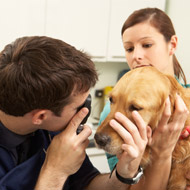
Over 90 per cent of small animal vets are worried that a consequence of antibiotic resistance could be the inability to treat infections in pets, figures released by the British Veterinary Association (BVA) reveal.
Results from the BVA's 2014 Voice of the Veterinary Profession panel survey also show that almost eighty per cent of small animal vets fear that antimicrobial resistance could affect their ability to control post-surgical infections.
The results of the survey have been released to coincide with European Antibiotic Awareness Day, which is marked today (Tuesday, November 18). Other statistics reveal:
- Nine in 10 vets are concerned about antimicrobial resistance with a third describing themselves as very concerned
- 72 per cent of small animal vets specify poor owner compliance (such as not making sure a pet finishes a course of antibiotics) as a main driver for antimicrobial resistance
- Nearly 90 per cent of small animal vets stated they had come under pressure to prescribe drugs to pets from their clients
- Just over 80 per cent of small animal vets said that their clients were not aware of antimicrobial resistance
The BVA are now calling for pet owners and veterinary surgeons to work together to combat the threat of antimicrobial resistance. John Blackwell, BVA president and veterinary surgeon said:
“The depth of our members concerns highlights the need for every one of us to do the right thing and take responsibility for combating antimicrobial resistance for the good of both human and animal health. This means owners working with vets and understanding that in some circumstances antibiotics may not be required to treat their pets.
“We need pet owners to help us. Just as people are ever more aware that they should not go to the doctor’s surgery with the expectation that they will be prescribed antibiotics, we would ask pet owners to not automatically expect antibiotics when their pet is not well.
“We need to better inform pet owners about the risks of not following their vet’s instructions precisely when antibiotics are prescribed, particularly about what the consequences can be for using antibiotics prescribed for one pet on another. On European Antibiotic Awareness Day I would urge owners to read the excellent BVA leaflet for pet owners on their role in relation to antibiotics and to take the pledge to become an Antibiotic Guardian. We are particularly pleased that there is a special pledge for pet owners and I would urge all pet owners to make that pledge.
“We know that owners love their pets and will often think that a course of antibiotics will be the best thing to help their pets when they are ill. But the inappropriate use of antibiotics could mean that in the long-term the companion animals that mean so much to so many of us may be at risk of very serious and life-threatening infections with no ability to treat them.”
BVA's leaflet on antibiotics for pet owners can be downloaded from www.bva.co.uk



 The RCVS has announced a new version of its 1CPD mobile app, with enhanced features for veterinary surgeons and veterinary nurses to record their continuing professional development.
The RCVS has announced a new version of its 1CPD mobile app, with enhanced features for veterinary surgeons and veterinary nurses to record their continuing professional development.